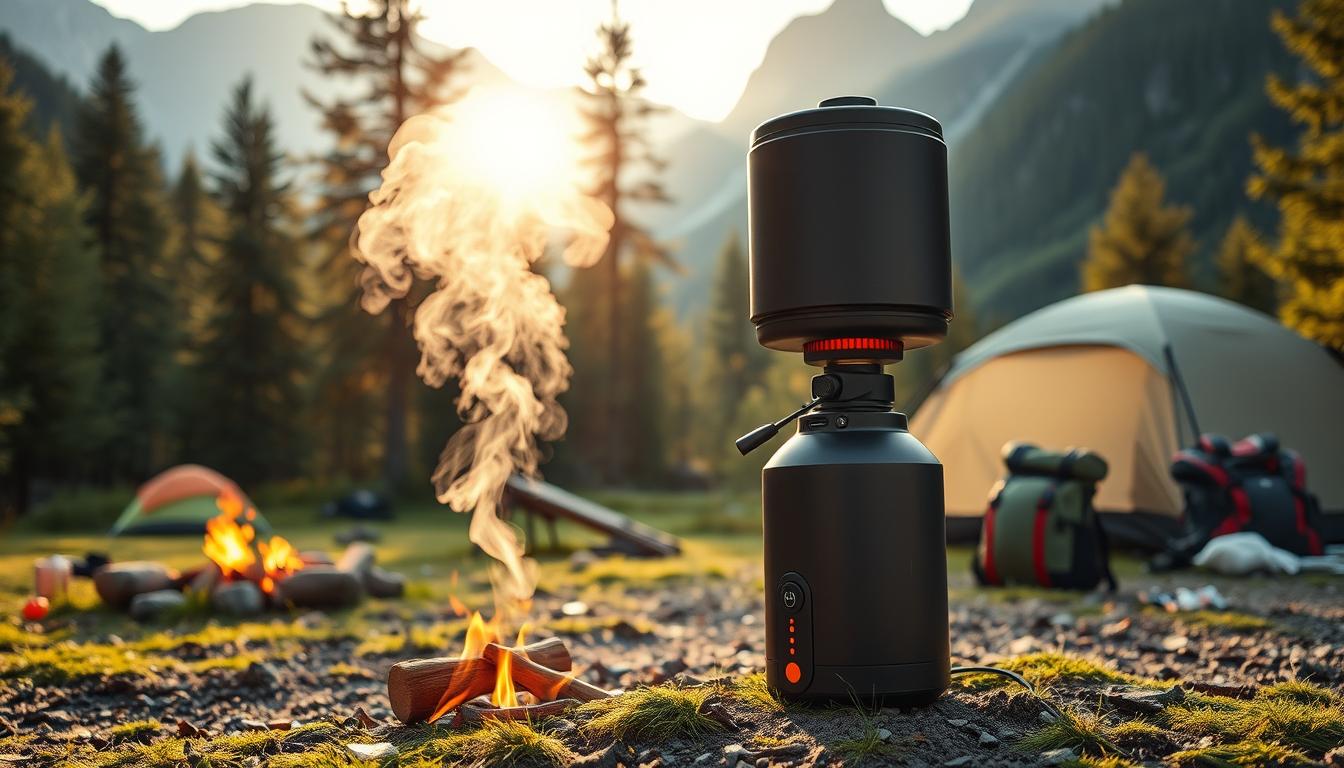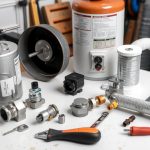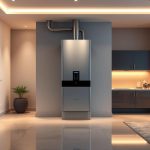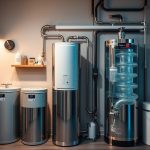The crisp mountain air and the distant chirping of birds are moments that define outdoor adventures. As an avid camper, I’ve found that a reliable portable water heater can make your wilderness experience luxurious. It turns a basic camping trip into a comfortable one.
Imagine standing in a breathtaking landscape, ready to enjoy a warm shower whenever you want. Modern portable tankless water heaters have changed outdoor living. They offer compact solutions for campers, RV enthusiasts, and anyone who loves the outdoors but doesn’t want to give up comfort.
Portable water heaters like the Camplux Outdoor Water Heater and Fogatti InstaShower Go have changed the game for outdoor lovers. These direct vent water heaters give you instant hot water. They’re powered by propane and made for maximum convenience in remote places.
Key Takeaways
- Portable water heaters provide instant hot water in outdoor settings
- Tankless designs offer energy efficiency and extended lifespan
- Compact models are ideal for camping and RV adventures
- Propane-powered systems offer reliable performance in various environments
- Modern portable heaters support multiple water usage points
Understanding Direct Vent Water Heaters

Water heating technology has changed a lot. Direct vent water heaters are now a top choice for homes. They are efficient and safe, thanks to their sealed combustion design.
What is a Direct Vent Water Heater?
A direct vent water heater is a special heating system. It’s designed to be efficient and safe. Unlike old water heaters, it uses a sealed combustion method.
- Sealed combustion system prevents indoor air contamination
- Uses dedicated intake and exhaust pipes
- Draws combustion air directly from outside the home
- Expels exhaust gases immediately outdoors
How Does It Work?
The venting water heater uses a dual-pipe system. One pipe brings in fresh air from outside. The other pipe takes exhaust gases out.
| Feature | Direct Vent Water Heater | Traditional Water Heater |
|---|---|---|
| Air Intake | External source | Indoor air |
| Exhaust Method | Direct outdoor venting | Traditional chimney or vent |
| Energy Efficiency | High | Lower |
“Direct vent water heaters represent a significant advancement in home heating technology, providing unmatched safety and efficiency.” – HVAC Engineering Quarterly
Professional installers suggest direct vent water heaters for homes wanting top performance and less environmental impact. This system saves energy and gives reliable hot water for homes and businesses.
Advantages of Direct Vent Water Heaters
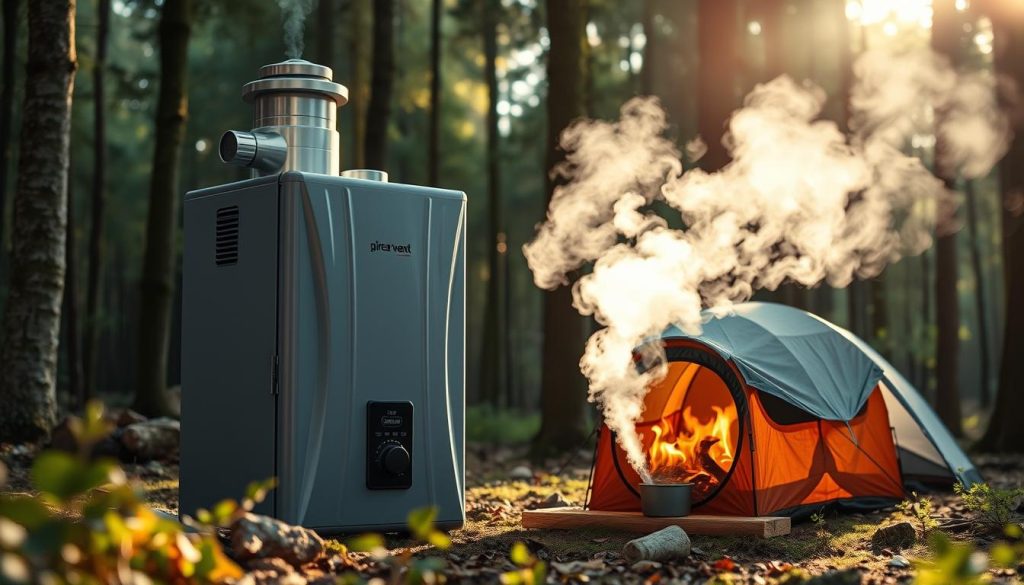
Direct vent water heaters are a top choice for those wanting efficient hot water. They offer many benefits over old water heating methods.
Energy Efficiency at Its Best
A direct vent water heater is very good at saving energy. It turns fuel into heat with high accuracy. Being Energy Star certified means it uses less energy and cuts down on bills.
- Reduced energy waste
- Lower monthly heating costs
- Improved overall system performance
Advanced Safety Features
Safety is key for any gas water heater. Direct vent models have sealed combustion chambers. This greatly lowers the risk of gas appliance dangers.
“Safety and efficiency are not competing goals, but complementary objectives in modern water heating technology.”
Compact and Intelligent Design
Many homes face space issues when picking water heaters. Direct vent models are designed to save space. They fit well in small areas.
| Design Characteristic | Benefit |
|---|---|
| Horizontal Venting | Flexible installation options |
| Compact Footprint | Ideal for smaller spaces |
| Sealed Combustion | Enhanced indoor air quality |
Choosing a direct vent water heater is smart. It’s efficient, safe, and a great home heating choice.
Choosing the Right Direct Vent Water Heater

Choosing the right direct vent water heater is important. You might want a tankless or a traditional gas water heater. Knowing what you need helps you make a good choice.
Size and Capacity Considerations
Capacity is key when picking a direct vent water heater. You need one that meets your household’s hot water needs. There are small 5L models and bigger 20L systems for different uses.
- Think about your household’s peak hot water use
- Look at flow rates from 0.5 to 5.28 gallons per minute
- Check BTU ratings from 20,000 to 110,000 Btu/hour
Fuel Type Options
Propane and natural gas water heaters have their own benefits. Knowing the fuel type helps get the best performance and efficiency.
| Fuel Type | Efficiency | Best Use |
|---|---|---|
| Propane | 85-90% | Remote locations, camping |
| Natural Gas | 80-85% | Residential homes |
“The right water heater isn’t just about heating water—it’s about finding the perfect balance between efficiency, capacity, and your specific needs.”
When picking a direct vent water heater, look for ones with sealed combustion chambers. These draw air from outside. They’re safer and better for indoor air quality and reduce carbon monoxide risks.
Pro Tip: Always include a carbon monoxide detector, regardless of your water heater type, to ensure maximum home safety.
Installation Basics
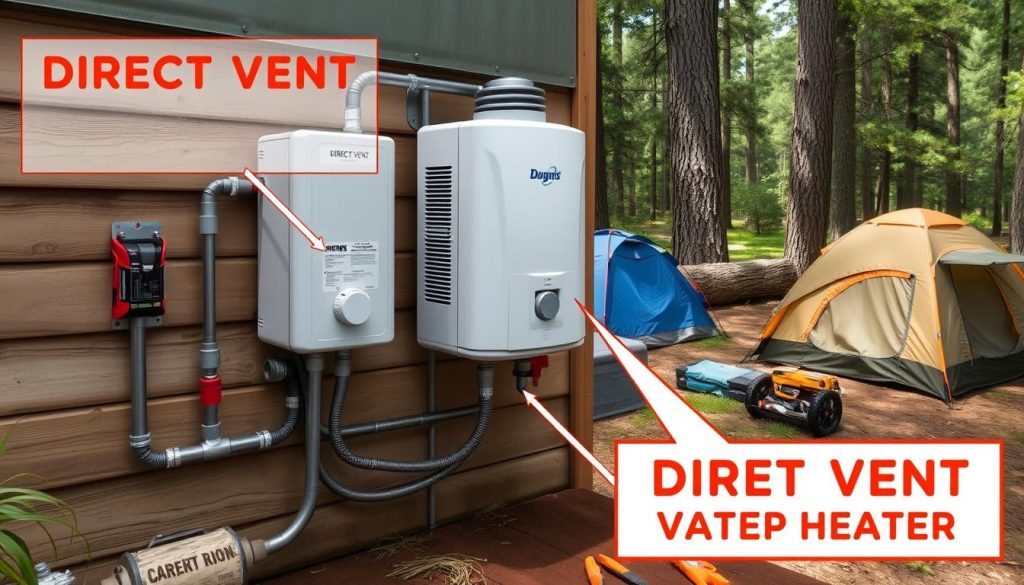
Installing a direct vent water heater needs careful planning and skill. Some homeowners might try to do it themselves. But, professional installation is safer and more reliable for venting water heater systems.
Professional vs. DIY Installation
Installing a direct vent water heater is complex. Professional installers make sure:
- Proper venting setup
- Following local building codes
- Safe gas connections and tests
- The system works well
“Investing in professional installation can prevent costly mistakes and safety hazards.”
Essential Tools for Installation
Whether you hire a pro or try it yourself, you’ll need certain tools:
| Tool Category | Specific Tools |
|---|---|
| Measuring Tools | Tape measure, level |
| Cutting Tools | Pipe cutter, hacksaw |
| Securing Tools | Adjustable wrenches, pipe wrenches |
| Safety Equipment | Safety glasses, work gloves |
The job usually takes 4-6 hours and costs $750-$2,950. Experts suggest yearly checks to keep your water heater running well.
Maintenance of Direct Vent Water Heaters

To keep your direct vent water heater working well, regular maintenance is key. This care helps your water heater last longer and work better for your home’s hot water needs.
- Do annual checks on all venting parts
- Look at the temperature-pressure relief valve every six months
- Flush the water heater tank to clear out sediment
- Check and replace the anode rod yearly
Routine Cleaning Practices
For tankless water heaters, special care is needed to keep them efficient. Experts suggest getting a professional cleaning once a year. This ensures they work at their best. Here are some cleaning steps:
- Remove mineral buildup from heating elements
- Clean the combustion chambers
- Make sure the burner is working right
- Check the gas line connections
“Regular maintenance can extend your water heater’s life by up to 50% and reduce energy costs,” says industry expert Mark Thompson.
Troubleshooting Common Issues
Understanding common problems is part of water heater care. Issues like uneven water temperature, odd noises, and less hot water are common. Here’s how to quickly find and fix these problems:
- Check the thermostat settings (aim for 120°F)
- Look for sediment buildup
- Make sure the venting is right
- Listen for strange sounds that might mean a mechanical problem
Pro tip: Get a professional to service your tankless water heater every year. This helps catch problems early and keeps your system running smoothly.
Direct Vent vs. Conventional Water Heaters
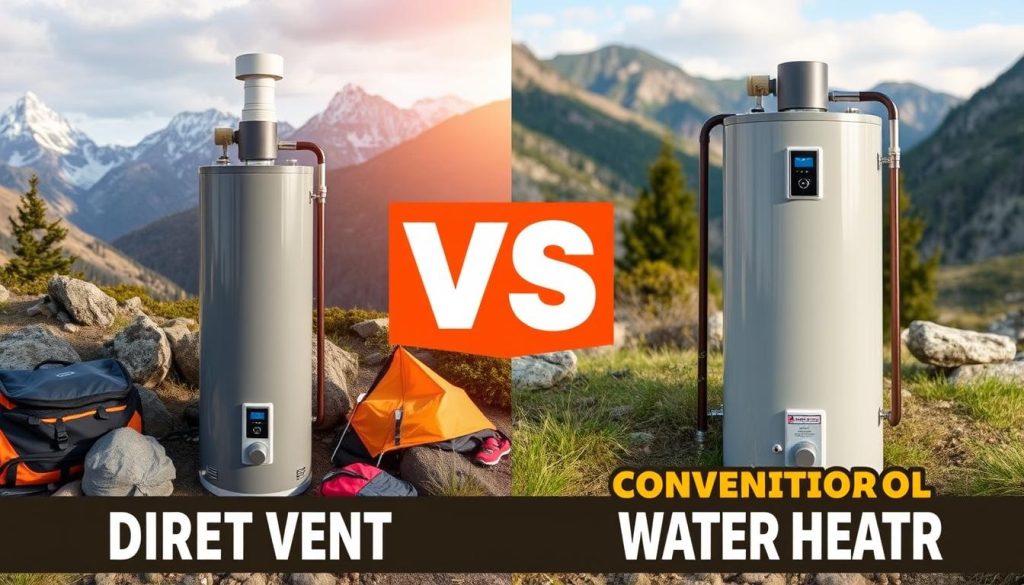
Choosing the right water heater is key to saving energy and money. Direct vent and conventional water heaters have different features to consider.
Performance Comparison
Direct vent water heaters outperform standard ones. They can be 80-90% efficient, while standard ones are around 60% efficient.
- Improved energy star water heater technology minimizes heat loss
- Enhanced venting system prevents indoor air quality issues
- Reduced risk of carbon monoxide buildup
Cost Analysis
Direct vent water heaters cost more upfront. But, they save money in the long run. The initial cost includes professional installation and special equipment.
| Water Heater Type | Initial Cost | Annual Energy Savings |
|---|---|---|
| Standard Vent | Lower | Less Efficient |
| Direct Vent | Higher | More Efficient |
*Energy Star certified models can reduce annual operating costs by up to 30%*
In Northern Colorado, more people choose direct vent water heaters. They offer better performance and safety. Plus, they don’t harm indoor air quality, making them great for families who care about health.
Popular Brands of Direct Vent Water Heaters

The market for gas water heaters has many top brands. These brands offer new solutions for your home’s hot water needs. Knowing the best tankless water heater makers can help you choose wisely.
Rheem Performance Platinum: A Detailed Overview
Rheem is a leading name in gas water heaters with its Performance Platinum series. This water heater has impressive features:
- 40,000 BTU Low NOx gas burner
- 77 gallons of hot water in the first hour
- Designed for households with 5+ people
- 59-inch tall with a slim 22-inch diameter
- Affordable pricing at $729
“The Rheem Performance Platinum offers exceptional hot water recovery with up to 40.4 GPH at a 90°F temperature rise.”
A.O. Smith Vertex 100: Premium Water Heating Solution
A.O. Smith is a top tankless water heater maker. The Vertex 100 Power Direct is a premium model that shines in the market:
- Energy Star compliant
- Flow rate of 164 GPH
- Supports 4-5 simultaneous showers
- Annual energy cost savings of $187
- Qualifies for 30% federal tax rebate
Both Rheem and A.O. Smith lead in direct vent water heating. They offer reliable and efficient hot water solutions for homeowners.
Environmental Impact
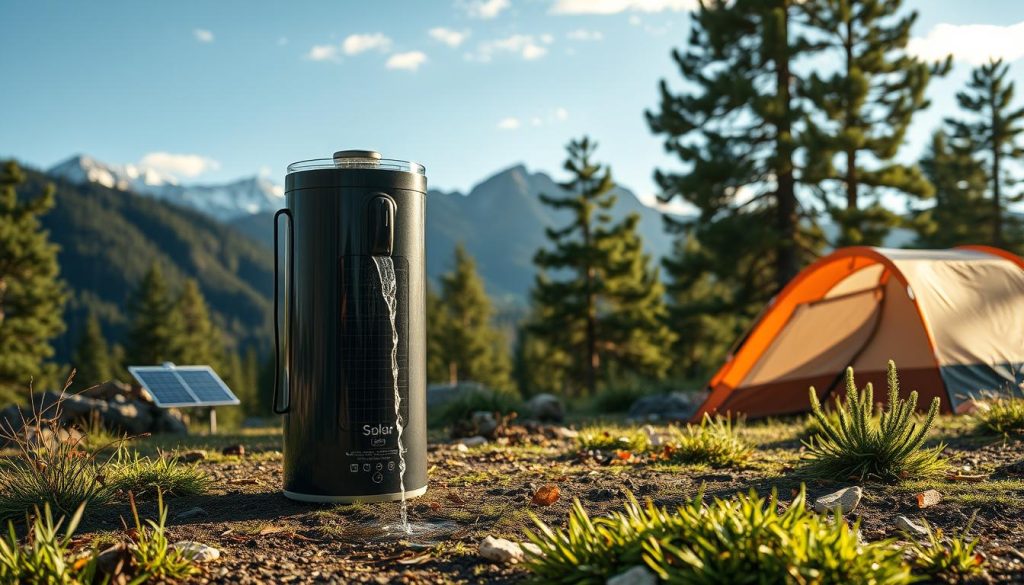
Water heating is a big part of our energy use at home. The U.S. Department of Energy says it uses about 18% of our home energy. New water heating tech is changing how we use energy and care for the planet.
Eco-Friendly Features
Modern water heaters are making homes more energy-smart. They have cool features that help us use less energy and cut down on pollution.
- Low NOx burners cut down on bad emissions
- Advanced insulation keeps heat in better
- On-demand heating saves a lot of energy
Energy Star Ratings
Energy Star water heaters are the best for the environment. They offer big benefits:
| Feature | Performance Impact |
|---|---|
| Energy Efficiency | Up to 98% efficient |
| Carbon Emissions | 50% less CO2 than old heaters |
| Lifespan | Up to 20 years of green use |
“Choosing an Energy Star water heater is an investment in both home comfort and environmental sustainability.” – Energy Efficiency Expert
Direct vent tankless water heaters show real commitment to the environment. They only heat water when you need it. This means less energy waste and lower bills.
The Role of Venting in Water Heaters

Venting is key for water heaters to work safely and efficiently. A sealed combustion water heater needs good ventilation to perform well and avoid safety risks. Knowing how venting works helps homeowners choose the right heating setup for their homes.
In the United States, there are strict rules for gas-powered water heater ventilation. If venting is not done right, it can cause serious problems, like safety hazards and damage to the equipment.
Types of Venting Systems
- Atmospheric Venting: The oldest method, using vertical ducts to get exhaust gases out through the roof
- Direct Venting: Uses separate pipes for gas intake and exhaust, working horizontally
- Power Venting: Adds an electric fan to help remove exhaust gases
Importance of Proper Ventilation
Good venting is important for a few reasons:
- It stops dangerous backdrafting of exhaust gases
- It keeps the water heater warranty valid
- It helps the water heater burn fuel efficiently
“Ventilation is not just about performance—it’s about protecting your home and family from possible health risks.”
In Southern California, direct vents are more common in homes. They work on simple principles and need little upkeep, making them a good choice for reliable hot water.
When picking a venting system, think about how hard it is to install, how energy-efficient it is, and how much upkeep it needs. A sealed combustion water heater with the right venting gives you peace of mind and steady hot water.
Safety Considerations
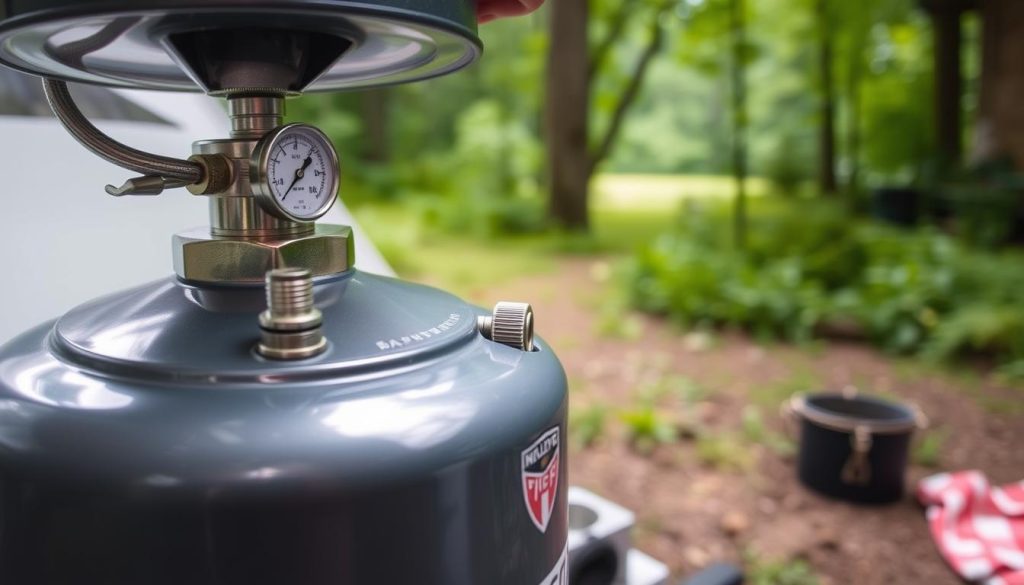
Water heater safety is very important for homeowners. It’s key to keep your family and home safe from risks of gas water heaters.
Carbon Monoxide Monitoring
Carbon monoxide is a big danger in homes with gas appliances. Today’s water heaters have safety features to lower this risk:
- Install carbon monoxide detectors near water heating equipment
- Ensure proper ventilation around gas water heaters
- Check for any signs of carbon monoxide leakage regularly
“Safety isn’t expensive, it’s priceless” – Unknown
Regular Inspection Protocols
Keeping your water heater safe needs regular checks by experts. They say to get an annual check to catch problems early.
| Inspection Focus | Recommended Frequency |
|---|---|
| Pressure Relief Valve Check | Annually |
| Anode Rod Evaluation | Every 3-5 Years |
| Ventilation System Inspection | Annually |
Key safety statistics show why you should keep up with maintenance:
- A high-temperature cut-off switch prevents overheating
- Category I gas appliances need special venting
- Double-wall vent pipes offer better safety
By following these safety tips, you can lower risks from gas water heaters. Regular checks and watching for problems are your best defense.
Performance in Cold Weather
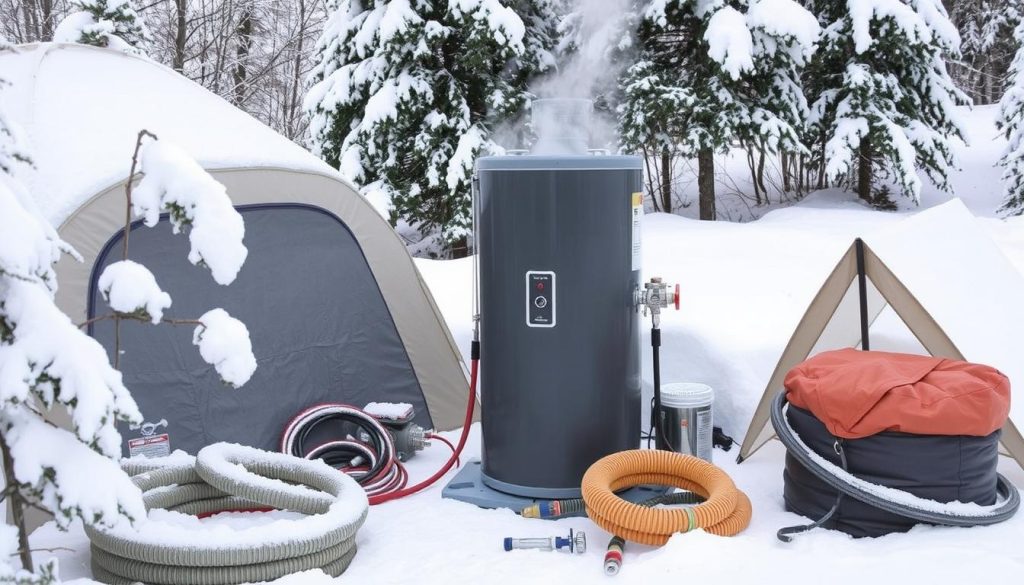
Winter brings special challenges for water heaters, like tankless models. Knowing how they work in cold weather helps keep them running well. It also stops freezing problems.
Gas tankless water heaters work best in cold weather. They have big advantages for winter:
- They can move water faster than electric ones
- They have built-in freeze protection
- They keep the hot water flowing steadily
Winter Use Tips for Tankless Water Heaters
Using your tankless water heater wisely in winter is key:
- Keep the water temperature between 120°F – 125°F at home
- Don’t put units in unheated places like garages
- Make sure pipes are well-insulated
Insulation Solutions for Cold Weather Protection
Keeping your tankless water heater warm in winter needs smart insulation. Groundwater temperature stays pretty steady. But, outside temperatures can affect how well it works.
“Proper insulation is the key to maintaining efficient water heater operation in cold climates” – Water Heating Expert
Here are important insulation tips:
- Wrap water pipes with top-notch thermal insulation
- Put the unit in a warm, inside space
- Use heat tape for extra pipe protection
By following these tips, you can keep hot water flowing all winter.
Cost of Operating Direct Vent Water Heaters
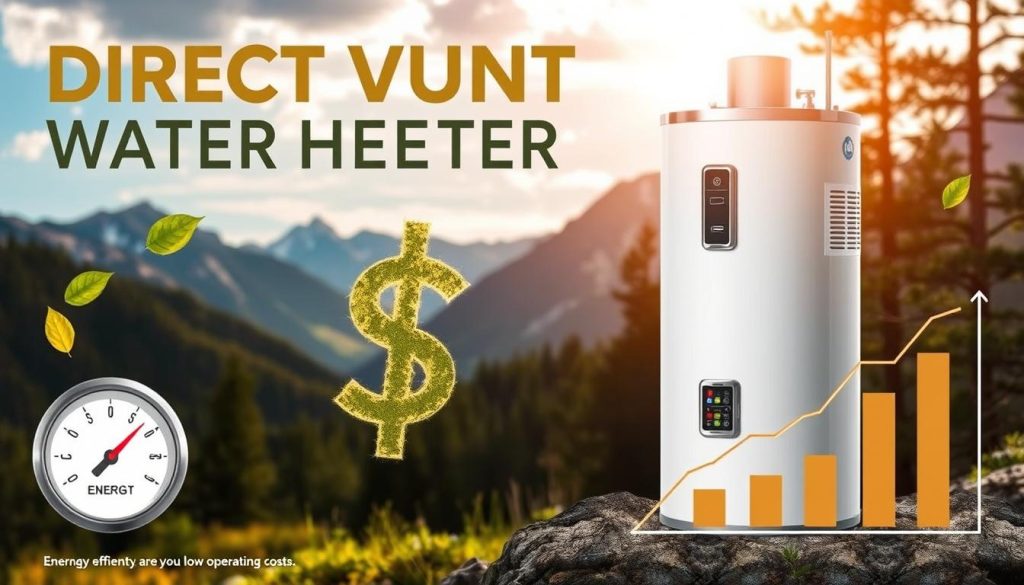
Knowing how much water heaters cost to run is key for homeowners wanting to save money and use less energy. Direct vent water heaters offer a good mix of performance and cost-effectiveness.
- Initial purchase price
- Monthly energy consumption
- Fuel type efficiency
- System performance characteristics
Monthly Expenses Breakdown
Costs for running water heaters can change a lot. Gas-powered direct vent models usually cost between $20 and $50 each month. This depends on how big your family is and how much hot water you use.
| Water Heater Size | Average Monthly Cost |
|---|---|
| 30-40 Gallons | $20-$30 |
| 50-75 Gallons | $35-$50 |
Long-Term Savings Strategies
There are ways to cut down on water heater costs over time. Here are some tips:
- Lowering water temperature by 10°F
- Installing drain water heat recovery systems
- Regular maintenance of venting components
Lowering hot water temperature by just 10 degrees can save 3-5% on energy costs.
Choosing an Energy Star certified direct vent water heater can lead to big savings. These savings can make up for the initial cost by lowering your monthly bills.
Direct Vent Water Heaters for Camping
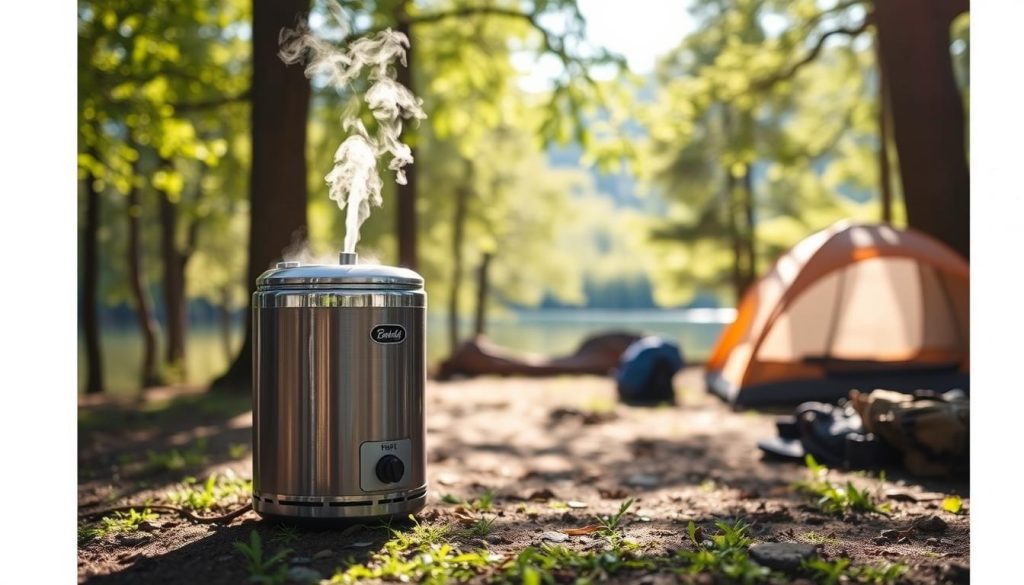
Outdoor lovers are now using portable water heaters for comfort. These camping water heaters change how we live outside, giving us hot water anywhere.
Portable water heaters are key for campers and hikers. They are small but powerful, making hot water easy to get in the wild.
Portable Options for Outdoor Enthuisiasts
Choosing a camping water heater involves several important things:
- They must be small and light
- Heat up fast
- Work with different fuels
- Be tough in tough places
Benefits for Outdoor Use
Portable water heaters bring many benefits:
- They give instant hot water for cleaning, cooking, and washing up
- They’re easy to carry and set up
- They use less energy
- They work well in many camping situations
Brands like Rheem and Rinnai make special water heaters for camping.
| Feature | Performance Metric | Average Rating |
|---|---|---|
| Heating Capacity | 19,000 BTU | 4.5/5 |
| Water Flow Rate | 0.5-0.8 GPM | 4.3/5 |
| Battery Life | 80 minutes | 4.6/5 |
“A reliable portable water heater makes camping much more comfortable.” – Outdoor Gear Expert
Today’s camping water heaters are a mix of tech and usefulness. They let adventurers have hot water wherever they go.
Innovations in Water Heating Technology
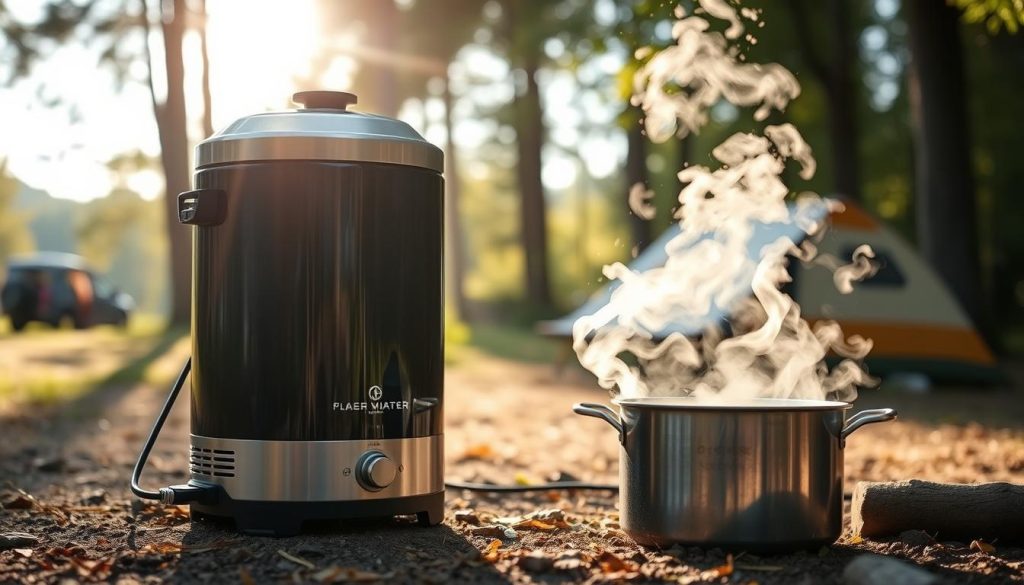
The world of water heating is changing fast. New tankless water heater technology and smart features are leading the way. These advancements are changing how we get hot water, making it more efficient and user-friendly.
Latest Technological Breakthroughs
Today’s water heaters are smarter and more efficient than ever. They offer:
- Up to 99% energy efficiency
- Precise temperature control within ±4°F
- Advanced digital monitoring capabilities
- Compact and space-saving designs
Smart Features Revolutionizing Water Heating
Smart water heater features are making home water heating smarter. Key innovations include:
| Feature | Benefit |
|---|---|
| Wi-Fi Connectivity | Remote monitoring and control via mobile apps |
| Energy Optimization | Intelligent scheduling and usage tracking |
| Predictive Maintenance | Early warning systems for possible issues |
“The future of water heating is not just about temperature, but intelligent, efficient, and personalized home comfort.” – Water Technology Expert
These new technologies are making tankless water heaters more available, efficient, and easy to use. Homeowners can now enjoy exact temperature control, big energy savings, and unmatched convenience with smart water heater features.
Customer Reviews and Experiences

Water heater user reviews offer valuable insights into different heating systems. People share their experiences, focusing on the good and bad of various water heaters.
Camping water heater experiences give us a peek into outdoor adventures. Users talk about the ups and downs of using portable heaters in the wild.
Pros and Cons from Users
- Instant hot water accessibility
- Energy efficiency improvements
- Compact design advantages
- Installation complexity concerns
“The Fogatti InstaShower Go transformed our camping experience with reliable hot water on demand!” – Sarah K., Outdoor Gear Enthuasiast
Case Studies
| Model | User Rating | Key Feedback |
|---|---|---|
| Peerless WV-DV | 4.5/5 | Superior reliability, efficient heating |
| Fogatti InstaShower | 4.2/5 | Excellent for outdoor adventures |
Looking for a reliable water heater? Check out detailed product reviews and expert advice. Real experiences show how important it is to pick the right water heater for your needs.
User feedback highlights the need to understand your needs before buying a water heater.
Future Trends in Water Heating
The world of water heater technology is changing fast. New solutions are coming that will make our homes more energy-efficient and comfortable. The U.S. Department of Energy says we can expect big improvements in water heating, like better heat pumps and smart home systems.
New technologies are changing how we heat water. Hybrid heat pump water heaters are leading the way. They use about half the energy of old electric models. They pull heat from the air, making them very efficient.
Emerging Technologies
Smart water heaters are getting smarter. They can diagnose problems, schedule use, and be controlled from phones. Solar and renewable energy are also growing, making it easier for homes to use them. The goal is to use less energy, saving people about $7.6 billion a year.
Predictions for the Industry
The water heating industry is heading towards greener and smarter options. We’ll see more use of renewable energy and new water heating tech. Heat pump technology will keep getting better, making eco-friendly choices more affordable for homes.
